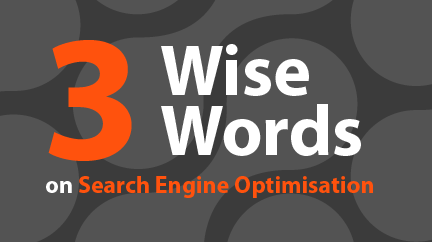
When starting any new SEO job you have to look at three words “When”, “Where” and “Why”:
- When: Is there a rush for the results to be seen? Is this needed before the Christmas rush for example. This can be a big factor and often the difference between using PPC like Adwords or using organic SEO instead.
- Where: Three parts to this; a) Where is the client located; b) where are they looking for customers and of course; c) where is the web site you are going to be doing the SEO for!
- Why: What is this site trying to achieve? You can optimise the site all you want but if the site isn’t optimised to achieve the goals your clients want then it isn’t going to do much good. Its the SEO’s job to point the client towards the keywords that are most useful and relevant to their product.
After the fundamentals
Now you know what you need to do, its time to find out how to do it. In many cases this is the hardest part of SEO; for the simple reason that the search engines are very careful to give as little information as possible out about how exactly the search engines work.
The key for most of SEO is simply common sense:
- Look at the search engine and ask ‘How will the search engine know that this keyword is the main one for this page?’. Some of these will be blatant such as including the word in your title tags and in the body text of your web site, others will be less obvious like including it in the images’ alt tags or having the word using in text that links to this page.
- Next ask ‘How do people take advantage of this to abuse the search engines?’ and avoid these tactics. A good example of this is the hidden or semi-hidden words that some people put at the bottom of their web site pages to try and emphasis the keywords they want to rank for. Don’t do this.
When making a web site to perform well then always bear these factors in mind:
- Content is king! Make sure your content is relevant to what you want to be found for in searches and says it clearly. Make sure you say enough as well, skimping on content will never be good for your site.
- Stay focused. Maybe your site does cover twenty different topics but each page on the site needs to ONLY cover one of those topics. If you start trying to make pages that cover multiple topics than you are more likely to end up just ranking badly for all of them.
- Never forget backlinks. Without decent links you are going to have a really hard time getting your site to rank well. The page rank of the web site that the link is coming from is nice but the relevancy of the link and the words used in the link often make more of a difference.
- Don’t try getting too fancy. A lot of ‘SEO’ techniques out there don’t work and have never been proved to work, link sculpting been a prime example. Get the basics right and see how your site does on searches BEFORE trying anything fancy. It may be you’ve just saved yourself hours of work simply by getting the stuff you would normally barely even consider right first.
- Be patient. Sites can take months to get their changes reflected in their rankings, don’t expect you wake up the next day and see your site on page one just because you made a few changes.
Steven Lockey
SEO and Online Marketing
